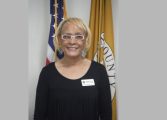At issue in the first set of complaints was the arrangement of the parking lot and campaign tent placement at the Kents Store ARC – the polling place for voters in the Columbia District. Fluvanna County pays the Kents Store ARC $125 each year to use the facility as a polling place. The President of the Executive Board of the ARC is Mel Sheridan, commissioner of the revenue and brother to Columbia supervisor-elect Mike Sheridan.
Campaign tents are commonly erected at polling places, and last-minute campaigning is done from them. State code dictates that tents may not be within forty feet of the polling place, but aside from that, there are no regulations governing the placement of candidate or political party tents. In this instance, campaign tents were erected days in advance of election day, but then were moved – some without their owner’s consent – at Mel Sheridan’s direction to widen a corridor leading from the main parking area towards the front of the building, and to make available a handicapped parking area. Mike Sheridan’s tent was erected closest to the entrance to the building; the way the parking and foot traffic were arranged, the majority of voters only walked by Mike Sheridan’s tent, and bypassed most of the other tents, including the one belonging to his competitor, Elizabeth Franklin. Some candidates and local party officials claim this arrangement, organized by his brother, gave an unfair advantage to Mike Sheridan at the polling place on election day.
Claudia Thomas, who was campaigning for the Columbia District seat on the school board, believed the arrangement of parking and tents was “a planned and orchestrated decision to direct the traffic flow not just to this (tent) but away from that one.” Thomas alleges her borrowed tent was damaged when it was moved without her consent.
Melissa Kenney, secretary of the Fluvanna Republican Party, asked for clarification of the state code pertaining to polling places. “I think …there needs to be an understanding of who is in charge of the property (at the polling place) and whether that is only on election day or for all electioneering activities.”
Catherine Hobbs, co-chair of the Fluvanna Democratic Party, feels that the situation was handled amicably, and added “I don’t want to mess with our local custom. I think we are all very happy to be able to set up in a neighborly way… I hope what comes out of this meeting is that people know that we can talk to each other and sort things out.” She also emphasized that “there is code that protects (campaign workers); we are allowed to distribute campaign materials outside the 40 foot buffer.”
Mel Sheridan, speaking as chairman of the Kents Store ARC, stated that the plan to rearrange the parking area and the creation of the walkway was approved by Precinct Captain Dan Graff the Sunday before election day. “I feel that we have tried to address anything that would make it easier for our citizens to vote. We have expanded the parking lot…we have put a deck at the back door to make the back door accessible.” Sheridan added, “If there is anything that this board feels …we as an ARC hall could do to help continue to improve the voting process we would certainly be happy to entertain that.”
Patchen asked Mel Sheridan if there was someone else serving on the ARC Executive Board who could manage election day logistics in the future to avoid the appearance of impropriety. “Part of the issue is what is called structural intimidation where a powerful political person or a powerful political family is viewed as owning and operating a polling site and giving direction to candidates or voters. It is a bit of a problem; it is an image problem and it is a substance problem,” Patchen said. Sheridan replied that he was sure another board member would be willing to handle the ARC’s management of the polling place in future elections.
Dennis Holder, who managed Elizabeth Franklin’s campaign for the Columbia District supervisor seat, pointed out that none of the campaigners knew about the rules affecting tent placement in advance. Holder suggested having a plat of tent sites drawn up and randomly assigning sites using a lottery system. “I guess what I am testifying to is the need for clearer rules and a more organized method for enforcing those rules.”
Elizabeth Franklin said, “When you have a situation where …relatives of a candidate or any advocate who is innately for a candidate can both dictate the placement of tents…and dictate the flow of parking it does not exactly have the perception of a free and fair election.” She added, “That night before I left the polls I got all of my signs out of the ground…and I will also add in a great gesture of bipartisanship Mr. Mike Sheridan helped me pull them out of the ground.”
Adrian Miller expressed his concerns on another issue – that a local grassroots group called Focus on Fluvanna’s Future acted as an unregistered political action committee during the most recent campaign. Patchen had gone to the state corporation commission’s website and confirmed that Focus on Fluvanna’s Future has no corporate or 501c3 status, which he said goes to the essence of Miller’s complaint. Political Action Committees must be registered by law. Miller asserted that Focus on Fluvanna’s Future used social media to campaign for specific candidates. “They had campaign literature posted on the websites that said …you need to vote for these people.” When asked by the chairman if he was saying that Focus on Fluvanna’s Future was specifically directing people to vote for a candidate, Miller, raising a sheaf of printed pages replied, “I have printed proof.”
The Fluvanna County Electoral Board will review all claims of impropriety and make a report to the State Election Commission, which will decide if any action is warranted.




